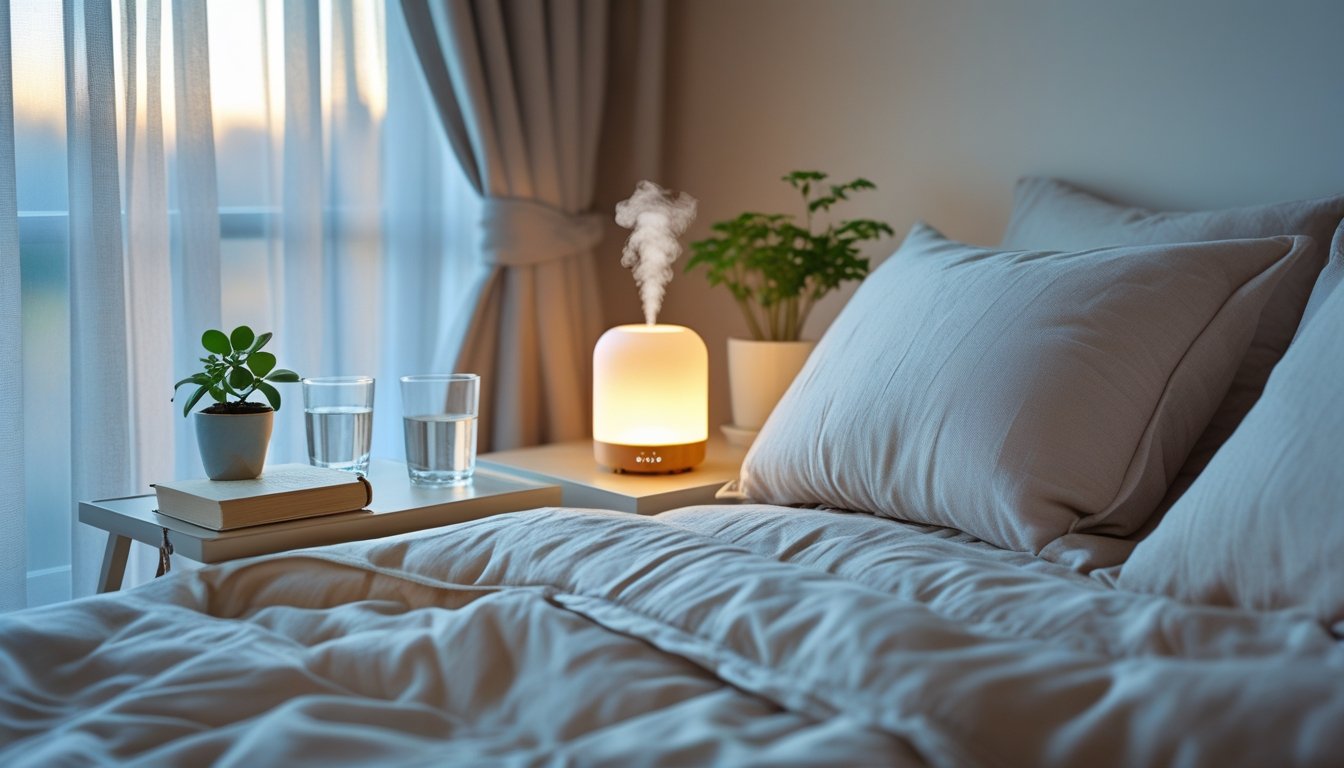Late updated: 14 May 2025 10:05
Written by: Ella Thompson
Sleep Hygiene Tips For Mental Wellbeing Improvement: A Guide to Healthier Rest
In our fast-paced world, mental well-being is more important than ever, and sleep hygiene plays a crucial role in maintaining it. Sleep hygiene refers to the practices we engage in to ensure restorative sleep, impacting our mental health and overall well-being. By focusing on healthy sleep habits, such as sticking to a regular sleep schedule and creating a restful environment, we can significantly enhance our mental resilience.

Key to improving mental well-being is understanding the connection between sleep patterns and emotional health. When we improve our sleep hygiene, we often notice improvements in our mood, concentration, and overall mental wellness. Factors such as consistent sleep routines, limiting exposure to screens before bed, and managing stress through relaxation techniques are fundamental strategies.
Let's delve into simple lifestyle strategies that help enhance sleep quality and, in turn, mental well-being. From creating an ideal sleep environment to managing stress and nutrition, even small changes can lead to significant improvements. These insights are designed to guide us on a journey towards better mental health through better sleep.
Key Takeaways
- Sleep hygiene is vital for mental well-being.
- Simple routines and practices lead to better sleep quality.
- Sleep improvements enhance emotional and mental health.
Fundamentals Of Sleep Hygiene For Mental Wellbeing
Maintaining a harmonious sleep pattern is crucial for enhancing mental health. Adhering to a consistent schedule, creating an optimal sleep environment, and reducing stimulants are key components in achieving restorative sleep.
Establishing A Consistent Sleep Routine
Creating a regular sleep schedule involves going to bed and waking up at the same time every day. This consistency trains our circadian rhythm, influencing both sleep quality and mental health.
A dependable bedtime and morning routine can mitigate symptoms of insomnia. For better mental wellbeing, incorporating relaxing pre-sleep activities, such as reading or meditating, is beneficial.
Avoid using electronic devices right before bed, as the blue light emitted can interfere with our natural sleep cycle. Consistency inherently supports improved cognitive functions and emotional stability.
Optimising Your Sleep Environment
Our sleep surroundings significantly affect our sleep quality and subsequently our mental state. A conducive sleep environment is cool, dark, and quiet.
Consider investing in a comfortable mattress and pillows, as these are pivotal to achieving good sleep. Utilising blackout curtains and white noise machines can further enhance your sleep environment.
Limit interruptions such as bright lights and noise. Having a dedicated area for sleep devoid of work-related items fosters a tranquil setting that promotes better rest and rejuvenation, supporting mental health.
Limiting Caffeine And Screen Time Before Bed
Excessive caffeine intake, especially in the afternoon and evening, can lead to sleep difficulties. It's advisable to refrain from coffee, tea, and other caffeine-rich beverages several hours before bed.
Similarly, reducing screen time before sleep is crucial. The light from screens can delay the production of melatonin, the sleep hormone. Engaging in calming activities such as reading a book instead of scrolling through devices helps prepare the mind for restful sleep.
Understanding the effects of caffeine and digital devices on sleep quality enables us to make informed choices, ultimately enhancing both our sleep and mental health.
Lifestyle Strategies To Improve Sleep And Mental Wellbeing

Improving sleep and mental wellbeing involves adopting specific lifestyle strategies centred on regular physical activity, relaxation techniques, and managing stress. Additionally, understanding the role of melatonin and natural sleep aids can be beneficial.
Incorporating Regular Physical Activity
Engaging in regular physical activity is crucial for both physical health and mental wellbeing. Exercise has been linked to improved sleep quality, as it helps regulate our circadian rhythms. Activities such as walking, cycling, or swimming can make a difference.
Structured exercise not only promotes restorative sleep but also reduces symptoms of anxiety and depression. Regular participation boosts mood by increasing endorphin levels. Let's aim for at least 150 minutes of moderate activity each week. Even simple activities like gardening or using the stairs instead of the lift can contribute to better sleep.
Using Relaxation Techniques and Mindfulness
Relaxation techniques offer a holistic approach to enhancing mental wellbeing and sleep. Techniques such as meditation, yoga, and breathing exercises promote relaxation and calm the mind. Incorporating mindfulness into our routines can help manage stress more effectively.
Practising these techniques regularly aids in lowering stress levels and improving focus. Meditation can be as simple as setting aside just a few minutes daily to focus on the breath. This mindfulness practice offers mental clarity while enhancing sleep quality by quieting the mind.
Managing Stress, Anxiety, and Depression
Stress, anxiety, and depression can significantly impact sleep and mental wellbeing. It's important to seek support from friends, family, or professionals if these feelings become overwhelming. We need to cultivate a supportive community around us.
Practical strategies include maintaining a balanced diet, setting achievable goals, and ensuring work-life balance. Finding joy in hobbies and activities can reduce stress. Communicating openly about mental health without stigma is crucial in preventing these conditions from affecting our sleep.
The Role of Melatonin and Natural Sleep Aids
Melatonin is a hormone that regulates our sleep-wake cycle. Using melatonin supplements or natural sources such as milk, cherries, and bananas can enhance sleep quality. These dietary sources can be integrated into our evening routine for added benefit.
Natural sleep aids should be used with caution. Some herbal teas and supplements can promote relaxation but might interact with medications. Consulting a healthcare provider before using any supplement ensures safe usage. Familiarity with our body's needs helps in choosing the right aids that align with our lifestyle for better sleep.
Frequently Asked Questions

In this section, we address common concerns about sleep hygiene and its impact on mental wellbeing. We explore effective strategies for improving sleep quality and highlight how environments can be optimised to support restful slumber.
What strategies can help one fall asleep more quickly and naturally at night?
Falling asleep quickly can be aided by establishing a relaxing bedtime routine. Techniques such as meditation and mindfulness are beneficial in calming the mind. Additionally, reducing exposure to screens before bed can help signal the body that it's time to rest.
Why is sleep hygiene crucial for mental health and well-being?
Good sleep hygiene positively impacts mental health by fostering restorative sleep. This is essential for regulating mood, cognition, and emotional stability. Poor sleep can exacerbate mental health issues, making it vital to prioritise practices that promote quality sleep.
Can you outline a basic sleep hygiene routine to improve sleep quality?
A simple sleep hygiene routine includes setting a consistent sleep schedule, creating a calming pre-sleep ritual, and ensuring an ideal sleep environment. Regular physical activity during the day and avoiding stimulants late in the evening also contribute to better sleep quality.
What are key habits that contribute to good sleep hygiene?
Establishing a regular sleep schedule and adhering to it is fundamental. Staying active during the day and limiting caffeine intake can improve sleep. Additionally, creating a bedroom environment conducive to sleep and managing stress are key to maintaining good sleep hygiene.
How does adhering to a consistent sleep schedule enhance mental well-being?
A consistent sleep schedule helps regulate our internal body clock, which supports cognitive function and emotional stability. This routine ensures we receive adequate rest, which is crucial for maintaining mental health and coping with daily stressors.
In what ways can the environment be optimised for better sleep hygiene?
We can optimise the sleep environment by keeping our bedroom dark, quiet, and cool. Investing in a comfortable mattress and pillow can make a significant difference. Reducing noise and minimising light exposure are essential steps to create a restful setting.
